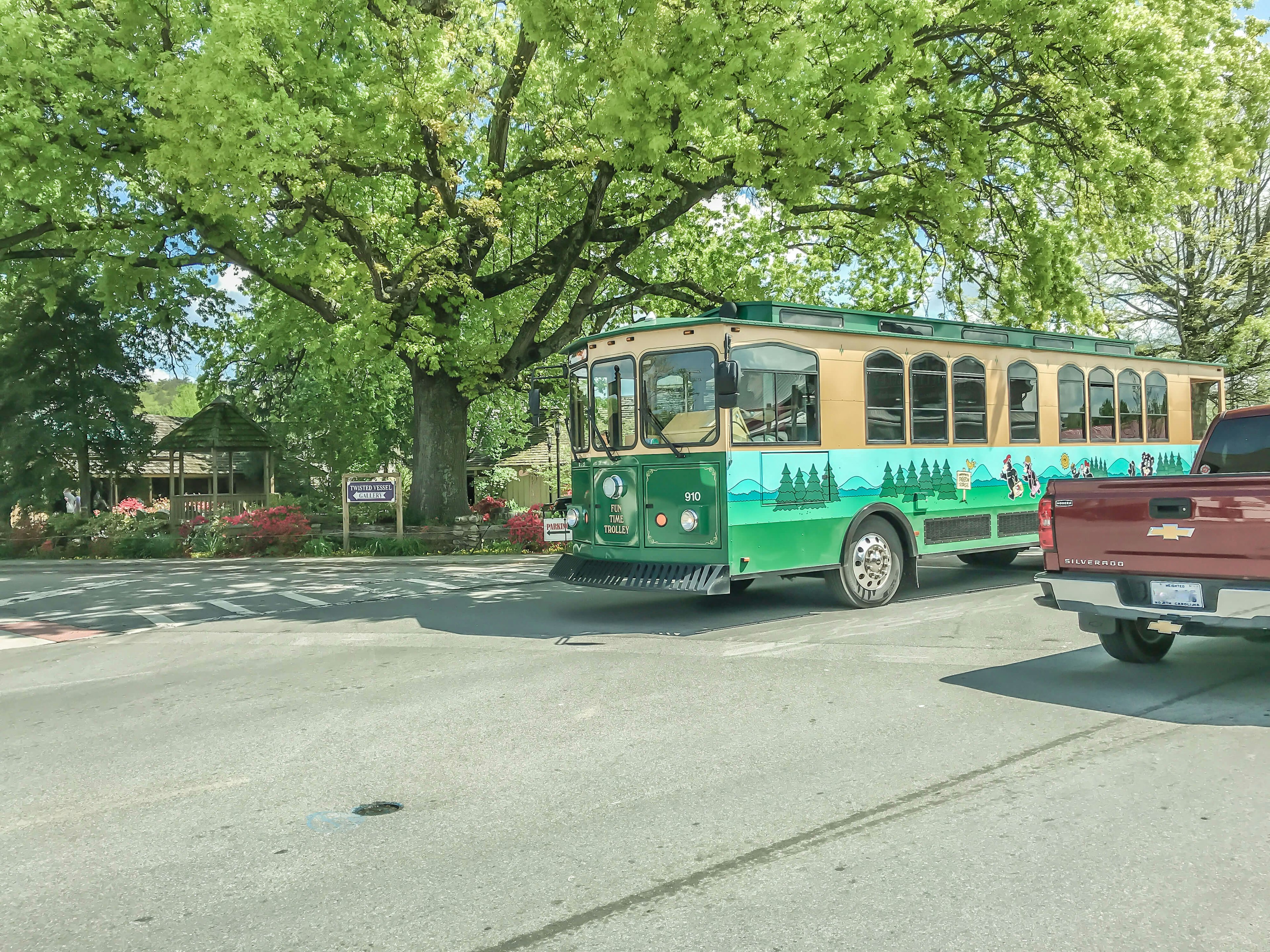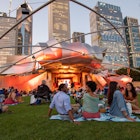
The best ways to get around Gatlinburg and Pigeon Forge

May 6, 2022 • 9 min read

Gatlinburg is easy to explore on foot © Radu Negrean / EyeEm / Getty Images
Great Smoky Mountains National Park is the most visited national park in the United States, and traffic is heavy in its gateway towns of Gatlinburg and Pigeon Forge, Tennessee, especially in the summer and on autumn weekends, when the leaves in the Smoky Mountains change color.
Travelers driving to and from the park funnel through downtown Gatlinburg on Parkway/US 441, which continues north 7 miles to Pigeon Forge, the home of Dollywood. Gatlinburg is easy to explore on foot, but Pigeon Forge is not. Depending on your destination, shuttles can be an inexpensive – if not always quick – way to explore top attractions in both cities. Download the Gatlinburg app for trolley maps and real-time information about parking availability in city lots.

Exploring on foot
Gatlinburg
Downtown Gatlinburg is compact and walkable – just be aware that its sidewalks can get uncomfortably crowded.
The main thoroughfare is Parkway/US 441, which rolls south through Gatlinburg right into Great Smoky Mountains National Park. (US 441 becomes Newfound Gap Rd after entering North Carolina.)
Gatlinburg's busiest section of Parkway runs uphill from Stoplight 3 – which overlooks the junction of Parkway and East Parkway/US 321 – to the entrance to the park. This congested 1-mile stretch to the park’s entrance is packed tight with pancake houses, souvenir shops, Ripley’s Believe It or Not museums and moonshine distilleries. Traffic is typically heavy too.
For a more tranquil walk through downtown, follow River Rd south from Parkway at Stoplight 5. This route bypasses the main attractions but runs along the Little Pigeon River. The 2-mile Gatlinburg Trail links the southern fringe of downtown with Sugarlands Visitor Center inside the national park. There are currently no public shuttles to the park or within the park.
Pigeon Forge
For the most part, Pigeon Forge is not pedestrian friendly. Attractions are spread along a 5-mile section of Parkway that is heavy with traffic most of the day and usually into the evening. There are sidewalks, but crossing can be difficult – the road is six lanes wide, and stoplights are far apart. There's also no shade, and distances between attractions are long.
One pedestrian-friendly option is the Riverwalk Greenway, a shaded, 6-mile multi-use greenway along the West Prong of the Little Pigeon River. It begins on Butler St near Patriot Park (Old Mill Ave) and connects with the Island entertainment district and the Pigeon Forge Community Center. The Island, which sprawls across a broad plaza anchored by the Great Smoky Mountain Wheel, is also pedestrian friendly.

Taking a trolley or shuttle
Gatlinburg
Free travel on three routes in and around Gatlinburg. All three stop at the Gatlinburg Mass Transit Center beside Ripley’s Aquarium of the Smokies, where there is a visitor center.
The Purple Route loops around Parkway and River Rd downtown, passing many of the area's top attractions. It also links to the Park & Ride at the Gatlinburg Welcome Center & Great Smoky Mountains National Park Information Center, which are all located on Parkway about 2 miles north of downtown.
Drivers coming into Gatlinburg from Pigeon Forge can park for free at the Park & Ride, then hop the Purple Route trolley, avoiding parking fees and hassles in Gatlinburg. The Purple Route’s hours of operation are 8:30am to midnight from May through October, with shorter hours the rest of the year.
The seasonal Yellow Route stops along the Great Smoky Arts & Crafts Community, an arts trail lined with galleries, studios and shops. The Blue Route runs to the Convention Center, City Hall, Rocky Top Sports World and the Community Center.
Pigeon Forge
Pigeon Forge operates six routes. Five of them run year-round, and there is one seasonal route in summer to Dollywood’s Splash Country. All trolleys stop at Patriot Park (186 Old Mill Ave), where parking is free.
Fares vary by route, and you pay per trip unless you have purchased a day pass. Hours are 8:00am to midnight March through October, with shorter hours the rest of the year. An all-day pass costs $3. Passes can be purchased at the mass transit office at Patriot Park.
Trolleys run north and south along Parkway in Pigeon Forge, while the Dollywood Trolley runs between Patriot Park and Dollywood ($2.50). The Gatlinburg Welcome Center Trolley ($1) travels nonstop from Patriot Park to the Gatlinburg Welcome Center, mentioned above, which is 2 miles north of Gatlinburg. Transfer to the Gatlinburg Purple Route for a trolley ride into downtown Gatlinburg.
Guests at Dollywood’s DreamMore Resort can ride a complimentary shuttle to Dollywood and Dollywood's Splash Country. Guests who prefer to drive their own cars can park for free at either park.
Note that riding trolleys in both cities can be time-consuming, especially if crowds are heavy.

Getting around by car
Gatlinburg
You don’t need a car to explore downtown Gatlinburg and its attractions, which are mostly contained within a 1-mile stretch of Parkway. Traffic is quite heavy in summer and on weekends, and driving can be slow-going. If you want to explore the adjacent national park in any depth, however, you will need a car.
Parkway is the main thoroughfare through downtown, and it rolls directly into the park. It also links to Pigeon Forge. Directions are often given by the stoplight number along Parkway.
Parking
The city operates two large garages downtown, each with about 365 spots. One is at the Ripley’s Aquarium (161 Greystone Heights Rd), and the other is the McMahan Parking Garage (520 Parkway) at Stoplight #3. Each costs $10 per day. There are free park-and-ride lots at the Gatlinburg Welcome Center and another on Hwy 321 at the City Hall complex. After parking, hop on a shuttle to downtown. Rates at private lots can range from $15 to $20 per day.
Top tip: If you’re very lucky, or very early, you might find a free spot on River Road.
Pigeon Forge
Most travelers will need a car in Pigeon Forge, which stretches 5 miles along Parkway. Parkway is six lanes wide in spots and lined with attractions and shops. Although trolleys do travel to more than 200 stops in Pigeon Forge, it may be easier to drive your own car.
You may not want to drive to Dollywood or Dollywood's Splash Country, however – parking at each park is $25 per day. A more economical option is to park at the free lot at Patriot Park and then hop a shuttle. Trolley fare is $2.50 one way or $3 for an all-day pass. If there's a stop near your hotel, you could catch a trolley to Patriot Park and avoid driving altogether. Have the exact fare ready, because no change is given.
Car rental
There are eight rental-car agencies at McGhee Tyson Airport in Knoxville. The airport is the best place to rent a car if you’re planning to explore the gateway towns and the national park. The airport is 35 miles from Pigeon Forge and about 45 miles from Gatlinburg. There is an Enterprise Rental Car in Sevierville, and several agencies rent Jeeps and adventure vehicles in and around Gatlinburg.
Electric-car charging stations
There are 11 free places to charge your vehicle across Pigeon Forge, including stations at the city-run Mountain Lot (2989 Teaster Lane), the Island and the Titanic Museum.

Taxi and ride-sharing
Taxis are available across Pigeon Forge and Gatlinburg, as are Uber and Lyft. Taxi services to Pigeon Forge can cost $60 to $70, while trips to Gatlinburg cost $80 to $100. Ride share prices vary.
You will most likely need to reserve a taxi in advance, because hailing a taxi on the street may be difficult in Gatlinburg and particularly hard in Pigeon Forge.
Seeing the sights by bike
Cycling on Parkway is not recommended in Gatlinburg or Pigeon Forge due to heavy traffic.
Trails and Greenways
You can bike from the southern edge of Gatlinburg into the national park on the two-mile Gatlinburg Trail. The trail ends at the Sugarlands Visitor Center. The Townsend Bike Trail in Townsend is a paved trail running alongside US 321 for about 5 miles, with sections overlooking the pretty Little River.
In Pigeon Forge you can hop on the Riverwalk Greenway, which stretches across the city for about 4 miles. You can pick it up on Butler St near Patriot Park or at the Island.
Inside the national park the 11-mile Cades Cove Loop Rd is closed to motorized vehicles on Wednesdays from early May through September. Cycling past wildlife and historic structures, free of bumper-to-bumper cars, is an invigorating and stress-free way to explore.
Driving tours and Jeep adventures
Several companies lead adventure tours into the mountains. These trips aren't designed for point-to-point travel, but they can be a fun and informative introduction to the national park and the Smoky Mountains.
tours drive to scenic areas of the park, and guides discuss local history and flora and fauna. There's off-road 4x4 fun at the end of the tour. For more options, check the Pigeon Forge Chamber of Commerce's of regional guiding companies.
The national park sells inexpensive booklets to accompany self-guided driving tours to different areas of the park. The booklets include information about history, wildfire and plants, and these details correspond to numbered posts and landmarks. Destinations include the Cades Cove Loop Rd, Newfound Gap Rd and Roaring Fork Motor Nature Trail. Buy a booklet at one of the park's visitor centers or online.
Accessible travel in Gatlinburg & Pigeon Forge
All Gatlinburg and Pigeon Forge mass-transit trolleys are lift-equipped for wheelchairs and other mobility aids. The lifts can be accessed at any designated trolley stop.
ADA paratransit service may be available for origin-to-destination services in Gatlinburg for those whose disability or health condition prevents them from using the fixed-route service, but riders must apply and be approved. Those who cannot get to a trolley stop in Pigeon Forge can call for a paratransit van pickup the next day by calling 865-453-6444. Paratransit van fare is $1 per person one way.
Sidewalks can be steep and crowded in Gatlinburg, which makes them less than ideal for wheelchairs and strollers. You can escape the crowds and get a bird’s-eye view of downtown on the wheelchair-accessible Ober Gatlinburg tram, which has back ramp access and priority boarding. Just note that not all rides and activities at the summit can accommodate wheelchairs.
The paved half-mile Sugarlands Valley Nature Trail, located in a second-growth forest on US 441 south of Sugarlands Visitor Center, is an accessible trail along a stream. Interpretive exhibits share details about the surrounding natural features.
Download Ïã¸ÛÁùºÏ²Ê¼´Ê±¿ª½±â€™s free online to accessible travel online resources.
You might also like:
Here is the best time to visit Gatlinburg, Tennessee
First-timer's guide to Great Smoky Mountains National Park
American beauties: the best towns in the Smoky Mountains
Explore related stories


 Tips & Advice13 best places to visit in North Carolina from the Smoky Mountains to the Outer Banks
Tips & Advice13 best places to visit in North Carolina from the Smoky Mountains to the Outer BanksSep 9, 2024 • 10 min read


 CampingI took my camper van across 48 US states. These are my 10 favorites
CampingI took my camper van across 48 US states. These are my 10 favoritesApr 14, 2024 • 8 min read




